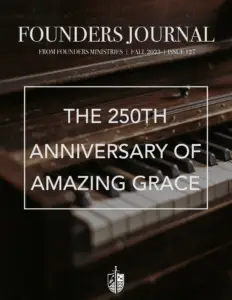’Twas grace that taught my heart to fear,
And grace my fears relieved;
How precious did that grace appear
The hour I first believed!
This second stanza of John Newton’s “Amazing Grace” provides Christians with a rich and subtle insight into the nature of God’s saving work in the lives of believers. The verses encourage us to consider God’s providence over both the universal, objective elements of conversion – the new birth, including conviction of sin, repentance, and faith – but also over the subjective, particular circumstances of that conversion: the events, conversations, and degrees of the conviction that all believers feel. All are under the sovereignty of God in working out His purpose to save His people.
What might surprise the reader upon closer examination of the hymn is the stanza’s first line: “’Twas grace that taught my heart to fear, And grace my fears relieved.” What is interesting about this line is that it at least implies that the same grace which prompts fear answers that fear. But how can the grace of God prompt fear? The fear Newton mentions is spurred by recognition of the Law’s demands and the wrath of God imminent upon a sinner. The Scriptures reinforce this fear of God’s wrath. As far back as the Exodus, Moses observes, “Who considers the power of your anger, and your wrath according to the fear of You?” (Psalm 90:11-12). In the New Testament, the writer of Hebrews rhetorically declares, “It is a fearful thing to fall into the hands of the living God” (Heb. 10:31). This fear from God’s righteous standards is succinctly articulated by Abraham Booth, the great English Particular Baptist:
“[W]hen the Spirit of God convinces of sin by the holy law, and manifests its extensive demands to the conscience of the sinner; when he is informed that every sin subjects the offender to a dreadful curse; then his fears are alarmed and his endeavours are quickened…for now, guilt burdens his soul, and conscience sharpens her sting; while the terrors of the Almighty seem to be set in array against him. The duties he has neglected, the mercies he has abused, and the daring acts of rebellion he has committed against his divine Sovereign, crowd in upon his mind and rack his very soul.”[i]
But again, how can fear be gracious? It is gracious in hindsight when considered as part of the process through which God redeems a Christian. It could be said that God prepares a person for salvation through an awareness of the guilt and judgment impending upon him as a sinner before God. The fear of God’s Law can precede the comfort of God’s Gospel as day follows night.
Newton’s own life and conversion provides a concrete example of just this kind of providential work. While a sailor at sea, living in “carnal security,”[ii] Newton was awoken by a violent storm that threatened to sink them, and though working frantically to exhaustion to save the ship, he despaired of any hope of deliverance:
“As he was returning, [Newton] said, almost without meaning, ‘If this will not do, the Lord have mercy upon us!’…[s]truck with his own words, it directly occurred to him, What mercy can there be for me!”[iii]
Ultimately, the ship and crew were spared, but it was through these circumstances that Newton came to reflect on the Scripture’s teaching of his need for Christ and the indwelling presence of the Holy Spirit within him, and during this trial became a follower of Jesus. Yet, it should be clear, it was not ultimately physical death that concerned Newton – he was terrified that, were the Scriptures true, his soul would be lost, condemned before a holy God. It was precisely this experience of fear before the terror of God’s holy wrath that John Newton learned about the allaying power of the Gospel.
Nor is Newton’s life an anomaly in redemptive history. The book of Acts especially provides examples of fear preceding the comfort found only in Christ. There is the record of Pentecost. After hearing Peter’s preaching, the Jews were “cut to the heart” (Acts 2:37) – that is, they were filled with anxiety and remorse over the realization that they had been responsible for crucifying the Lord’s Christ.[iv] In their desperation they cried out for some source of hope – “Brothers, what shall we do?” – recognizing that they had no apparent hope for redemption against the God they had offended. Yet they received the words of Peter to repent of their sins and became devoted to the apostles’ teaching and fellowship (2:42). Another example can be found in the Philippian jailer. He too, upon learning of Paul and Silas’ presence in the cell, became filled with fear and trembling, and not merely due to his concern for his life, but clearly through the witness of their praying and singing hymns (Acts 16:25).
The idea that God prepares sinners for conversion prior to regeneration has roots in Protestant history. Particularly during the Puritan era, as Scriptural truths were being rediscovered and developed, it was a topic of discussion how much of God’s illumination merely convicted of sin and how much actually saved a person.[v] They astutely observed that Law works in the hearts of men so as to deprive them of any sense of hope to stand before God in their own righteousness and power, and it is through that helplessness that the sweetness of the Gospel message is tasted. For example, in Bunyan’s The Pilgrim’s Progress, we see in the early pages that the pilgrim Christian is tormented by the burden of his sin lashed to his back. He is aware of his guilt, and desires to be free of its ponderous weight. Yet it will be some time in the narrative before Christian is free of his burden. In fact, it will not be removed until he enters the Wicket Gate and the place of deliverance beyond. Consequently, the reader may infer that, though we cannot know for certain how long it is, there is sometimes distance between a believer’s awareness of his burden (the fear of God’s Law) and that burden’s removal (the power of the Gospel to save).
Yet this fearful sensitivity, called conviction of sin, cannot be identical with regeneration. It is not clear merely from conviction whether the Spirit’s work is completed, or whether this constitutes earthly fears of heavenly realities now considered. John Owen, reflecting on the work of the Spirit in regeneration, observes, “ordinarily there are certain previous and preparatory works, or workings in and upon the souls of men, that are antecedent and dispositive unto it. But yet regeneration doth not consist in them, nor can it be educed out of them.”[vi] Newton himself concurs, “We may be unable to judge with certainty upon the first appearance of a religious profession, whether the work be thus deep and spiritual or not; but ‘the Lord knows them that are his.”[vii] Though the outside fear may not be infallible as to its origin, it is nevertheless true that such fears can be and often are expressive of a heart in the process of being converted. This makes the nature of when regeneration takes place imprecise. The divine aspect of regeneration, the work of God, is internal; we only see external aspects – conviction of sin, repentance, faith in Christ. The new birth, in Jonathan Edwards’ words, may come in “a confused chaos…exceeding mysterious and unsearchable.”[viii] B. H. Carroll further articulates this imprecision:
“[c]onviction, repentance, and faith are the constituent elements of regeneration; that is, they are the elements within our range of vision. We can see only the under side of what is above us. When we describe it, we describe it as we see it. As the view is partial, the description is partial.”[ix]
Occasionally, some Puritans steered into language and concepts of God’s convicting work prior to conversion that were unhelpful and imbalanced. A particularly famous example is the New England Puritan Thomas Hooker. In some of his works he asserted that an acute sense of fear from God’s Law is a necessary qualification to repentance and faith: “[the pre-regenerate person] must be a lost man in his own apprehension…All men must thus be disposed before they can be saved.”[x] However, many contemporaries challenged Hooker’s suggestion that godly terror must first precede regeneration. From the earlier quote from Owen, we can see how he qualifies his observations with the word “ordinarily.” Preparatory works resulting in fear can certainly be present, but that is not a necessary precondition for the Spirit to work. Notably, the early Particular Baptist William Kiffen found Hooker’s thoughts distasteful, and his thoughts are reflected in Article 25 of the First London Baptist Confession of 1644 (1646 revision): “The preaching of the gospel to the conversion of sinners, is absolutely free; no way requiring as absolutely necessary, any qualifications, preparations, or terrors of the law, or preceding ministry of the law.”[xi]
More recent Christian theologians, especially after the First Great Awakening, have concurred with this hesitancy toward a unilateral experience prior to salvation. The thoughts of Archibald Alexander, living in the generation subsequent to the labors of Edwards, Whitefield, Rowland, and Wesley, summarize this consensus. After observing the idea of legal conviction (being convicted of the law’s curse) had “generally prevailed in all our modern revivals: and it is usually taken for granted, that the convictions experienced are prior to regeneration,” he then states, “But it would be very difficult to prove from Scripture, or from the nature of the case, that such a preparatory work was necessary.”[xii] In the present day Sinclair Ferguson observes, “Because God sees what he intends to produce in us and through is as his children, he exposes us to differing levels of conviction. Some like Peter’s sermon on Pentecost, are under conviction for minutes; others, like Paul, perhaps for days; yet others go through a dark night of the soul which seems interminable, like Bunyan and Luther before him.”[xiii]
These historical-theological accounts invite the question: if conviction of sin is a part of salvation – one sign of regeneration – why is it not essential prior to salvation? Further, how can some experience the conviction of sin and its attendant fear more acutely than others? Why do some not experience the degree of fear Newton summarizes so well in “Amazing Grace”? The answer to this lies in understanding what might be called universal and particular aspects of salvation. Every Christian is saved in accordance with God’s eternal electing plan, the universal character of this saving work between the God who redeems and the person who is redeemed. All sinners are hopeless in themselves to be saved. All three Persons of the Godhead participate in a person’s being brought from death to life; the work of the incarnate Son, accomplished in His earthly ministry, is implemented by the Holy Spirit who regenerates the believer at the behest of the Father’s effectual call. Every Christian is incorporated into the one people of God (Eph. 4:4-6). In sum, the work of redemption has a linear process, from the effective call to glorification, with regeneration, repentance/faith, justification, and sanctification falling between these (Rom. 8:30).
Nevertheless, this work of redemption, universal in character, takes place during a person’s life and experience, the particular aspect. Were it God’s will, He could simply redeem a person immediately with the fullness of Christ’s purchased salvation. This is certainly within the power of Him who called all things into being by the utterance of His Word (2 Cor. 4:6). Yet God has rarely chosen such an expeditious manner in saving sinners. Very often, in fact almost always, He works in a believer’s life through the events, circumstances, and processes unique to his life. Archibald Alexander, in his insightful Thoughts on Religious Experience, places these differences in experience within the situational, historical, and constitutional differences between each individual person, requiring pastoral wisdom in assessing a person’s spiritual state.[xiv] There is manifold wisdom in God’s way of saving sinners. Each person participates in the one salvation wrought by Christ, yet each person also contributes a distinct story of how that saving grace is manifested in him. John Murray observes, “If God has provided for the salvation of men, it must be salvation that takes effect in the sphere of human existence, that is, in the temporal, historical realm. Salvation as accomplished in time comprises a great many elements, factors, and aspects.”[xv]
The universal and particular aspects of redemption lead us to conclude that, though there is one salvation for all, the experience of one Christian in that process may drastically differ from another’s. All these circumstances, though unique, are not outside of God’s purview, but are the very means through which the Gospel, like leaven, works in the sinner’s heart to convict him of sin and bring him to faith and repentance. Whether the night of conviction is long or short, God’s grace brings a recollection of how He worked providentially in each of us to save us, drawing Christians into deeper devotion to Him for His grace, and a greater sense of our dependence on Christ for our unimpeachable hope.
“How precious did that grace appear, the hour I first believed.”
[i] Abraham Booth, The Reign of Grace: From Its Rise to Its Consummation (reprint, Sprinkle Publications, 2017), 100. A similar insight into the uncertainty of when redemption is genuinely effected can be found in John Bunyan’s autobiographical Grace Abounding to the Chief of Sinners. This short piece can be found in The Whole Works of John Bunyan (Grand Rapids: Baker Book House, 1977), 1:6-65. The Banner of Truth Trust has a standalone version of this title.
[ii] The Works of John Newton (Edinburgh: Banner of Truth, 1988), 1:25.
[iii] Ibid, 1:26, italics original.
[iv] The verb used here, κατανύσσομαι (“to be pierced, stabbed”), can mean pain in reference to anxiety or remorse. See Bauer, Danker, Arndt, and Gingrich, A Greek-English Lexicon of the New Testament and other Early Christian Literature, 3rd edition (Chicago, University of Chicago Press, 2000), 523.
[v] For a helpful discussion of the topic of “preparation,” see Joel R. Beeke and Mark Jones, A Puritan Theology: Doctrine for Life (Grand Rapids: Reformation Heritage Books, 2012), 443-461, especially 455-461.
[vi] John Owen, The Works of John Owen (Banner of Truth, 1981), 3:229.
[vii] Newton, Letters of John Newton (Edinburgh: Banner of Truth, 1976), 15, emphasis added.
[viii] Jonathan Edwards, Religious Affections, quoted in Beeke and Jones, A Puritan Theology, 459.
[ix] B. H. Carroll, “The Human Side of Regeneration,” in J. B. Cranfill, Sermons and Life Sketch of B. H. Carroll, D. D. (Philadelphia: American Baptist Publication Society, 1893), 177.
[x] Thomas Hooker, The Soul’s Preparation for Christ, 170-171, quoted in James M. Renihan, For the Vindication of the Truth: A Brief Exposition of the First London Baptist Confession of Faith (Cape Coral, FL: Founders Press, 2021), 99, emphasis added.
[xi] Quoted from Renihan, Vindication, 98. For evidence that Kiffen’s views are harmonious with the 1st London Confession, see ibid, 98-102.
[xii] Archibald Alexander, Thoughts on Religious Experience (reprint, Banner of Truth Trust, 1967), 15-16.
[xiii] Sinclair Ferguson, The Christian Life: A Doctrinal Introduction (Edinburgh: Banner of Truth, 2017), 42. Roland Bainton provides a useful summary of Luther’s “Damascus Road” experience in Here I Stand (New York: Mentor Books, 1950), 15. It is interesting to compare Luther’s earlier experience and subsequent vow with his later wrestling over salvation seen in the same biography at 46-51.
[xiv] Alexander, Religious Experience, 32-36.
[xv] John Murray, The Collected Writings of John Murray (Edinburgh: Banner of Truth, 1977), 2:123. Though Murray is specifying the diverse aspects of the plan of salvation from election to glorification, it is just as applicable to the personalized experience of salvation in the believer.






























